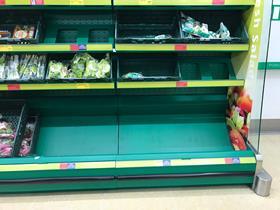
European retailers reacted “more quickly” to the recent supply shortages while UK retailers delayed raising prices and were left with empty shelves, suppliers have said.
Discussions have been prompted over how the UK retailers dealt with recent supply chaos from Spain, where growers have suffered some of the worst weather seen in 30 years, following images of well-stocked Spanish retailers next to shots of empty supermarket shelves in the UK. There were also reports that continental retail chains such as Germany’s Edeka did not experience the same shortages as the UK.
Speaking about recent media hysteria about “rationing” of iceberg, one leading supplier told FPJ: “It was a ludicrous situation which could have been largely prevented if the retailers had acted earlier and taken a more reasonable stance with their suppliers.
“The forecast is for iceberg to be short again mid-March as we see the results of planting gaps. It will be interesting to see how the retailers react to this.”
Another senior industry insider said “there’s no doubt that the UK retailers did too little, too late and consequently let their customers down with empty shelves.”
The source said UK retailers suffered a double whammy after they lost supply to the UK non-retail spot market trade, and to continental retailers who were prepared to pay higher prices. Shelves were then “stripped bare” by wholesale buyers taking advantage of the 50p prices, almost a third of what the free market price was, the source added.
Another supplier said European retailers were “quicker to react” to the supply shortages. “Spanish retailers in particular reacted quickly because they were there and they knew,” the supplier said.
But Tesco produce category director Darren Clough told FPJ that each retail situation was different, and produce that had been weakened by rain was no longer fit for export, but may still have met specifications in local markets.
“Spanish retailers sell a different spec, it’s not the same product that might be coming here,” he said. “Some product was weakened so shelf-life was reduced, which is why domestic markets may have been stocked over exports.
“Our growers are businesspeople, they have to protect themselves. It was a combination of trying to do the right thing by all their partners.”
Clough said he was “proud” of Tesco’s availability during the shortages, and thanked the retailer’s growers and suppliers. “There was some inflation, and we had to pass on some of those costs to reflect the market. But I’m really proud of our good availability,” he said.
One Spanish exporter told FPJ that production was down by an average of 30 to 40 per cent for most weeks and “UK supermarkets received ample warning but refused to change their pricing strategy”. This is what led to rationing and gaps on shelves, the exporter said.
Clough did not agree that prices should have gone up earlier, but declined to comment further on price rises across the industry.
“Retailers reflect market conditions, and everyone is in a different position,” he said. “What I will say is you saw some unusual things going on, such as Spanish and US product selling at the same time, which was the most obvious reflection of the market conditions.
“The situation is easing, we’re now pretty much back into full supply. I think Tesco managed it particularly well, as recent figures show we had significant outperformance.
“We are very thankful to our growers and suppliers, during what were some pretty acute circumstances. For some growers, it was the most rain they’ve had for 30 years. Because they’re not used to that much rain, the drains couldn’t cope so roads flooded.”
Asda, Morrisons and Sainsbury's had not responded to a request for comment at the time of writing.



